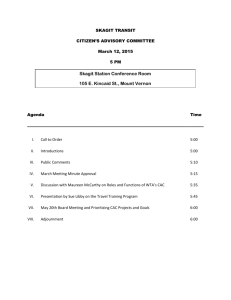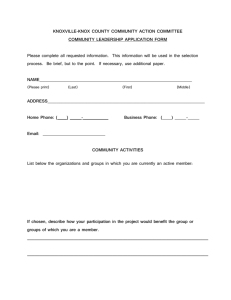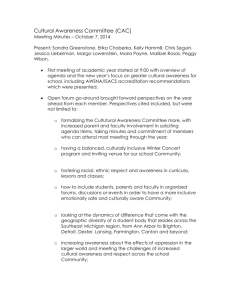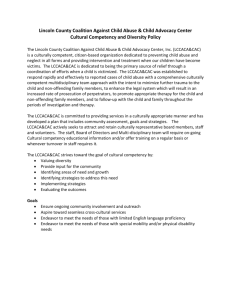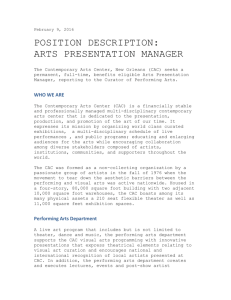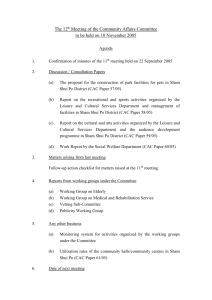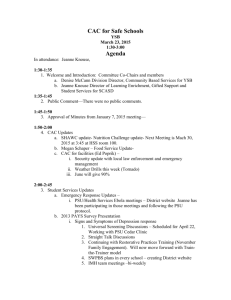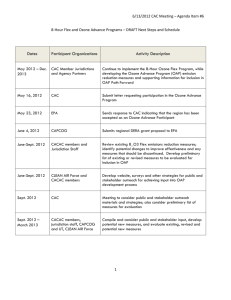Communications 2006 Meeting Minutes
advertisement
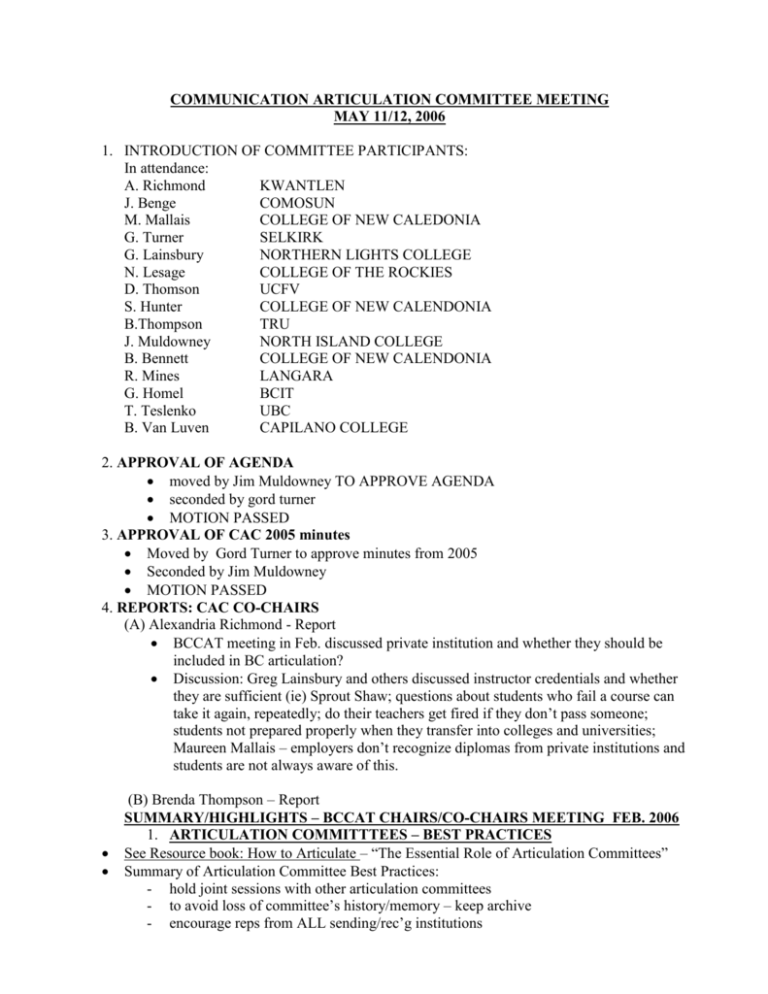
COMMUNICATION ARTICULATION COMMITTEE MEETING MAY 11/12, 2006 1. INTRODUCTION OF COMMITTEE PARTICIPANTS: In attendance: A. Richmond KWANTLEN J. Benge COMOSUN M. Mallais COLLEGE OF NEW CALEDONIA G. Turner SELKIRK G. Lainsbury NORTHERN LIGHTS COLLEGE N. Lesage COLLEGE OF THE ROCKIES D. Thomson UCFV S. Hunter COLLEGE OF NEW CALENDONIA B.Thompson TRU J. Muldowney NORTH ISLAND COLLEGE B. Bennett COLLEGE OF NEW CALENDONIA R. Mines LANGARA G. Homel BCIT T. Teslenko UBC B. Van Luven CAPILANO COLLEGE 2. APPROVAL OF AGENDA moved by Jim Muldowney TO APPROVE AGENDA seconded by gord turner MOTION PASSED 3. APPROVAL OF CAC 2005 minutes Moved by Gord Turner to approve minutes from 2005 Seconded by Jim Muldowney MOTION PASSED 4. REPORTS: CAC CO-CHAIRS (A) Alexandria Richmond - Report BCCAT meeting in Feb. discussed private institution and whether they should be included in BC articulation? Discussion: Greg Lainsbury and others discussed instructor credentials and whether they are sufficient (ie) Sprout Shaw; questions about students who fail a course can take it again, repeatedly; do their teachers get fired if they don’t pass someone; students not prepared properly when they transfer into colleges and universities; Maureen Mallais – employers don’t recognize diplomas from private institutions and students are not always aware of this. (B) Brenda Thompson – Report SUMMARY/HIGHLIGHTS – BCCAT CHAIRS/CO-CHAIRS MEETING FEB. 2006 1. ARTICULATION COMMITTTEES – BEST PRACTICES See Resource book: How to Articulate – “The Essential Role of Articulation Committees” Summary of Articulation Committee Best Practices: - hold joint sessions with other articulation committees - to avoid loss of committee’s history/memory – keep archive - encourage reps from ALL sending/rec’g institutions - send out topics for discussion prior to meeting on listserv conduct facility tour as part of meeting bring in guest speakers provide an outside activity send out minutes quickly encourage issue-focused discussions (ie) decreasing enrolment collect agenda items 2 years ahead check listserv: are we reaching everyone? create sub-groups for follow-up activities/projects try to include the SLP to attend and/or take active role at meetings if attendance if low – find out why (money/location/issues?) 2. RECALIBRATING THE BC TRANSFER SYSTEM I: ADDRESSING THE STRUCTURAL ISSUES (Finola Finlay) Questions: starting point for ‘recalibration’ – - Are we giving students enough access to transfer information? - Who actually articulates a course? - Should we include missing information such as: - Transfer info to/from private institutions? - Transfer info to/from institututions in other provinces or country? 3. STUDENT TRACKING STUDY Student Movement between BC Public Post-Secondary Institutions – available at http://www.bccat.bc.ca/pubs/bcstats05.pdf (see handout p. 5 “Conclusions”) Research Results Summary (handout provided to CAC committee) 4. SURVEY RESULTS – BCCAT CONSULTATION Summary of Results (handout provided to CAC committee; available on website) Discussion on Results of Survey Questions: 1. The sending/receiving issue: 95% yes. 2. 45% no criteria should apply; 51% institutions should provide assurances 3. Regional Transfer guides: 46% yes; 53% no. 4. 55% Greater Vancouver s/b starting point to regional transfer 5. 53% yes; 47% no. 6. 73% college to college 12. 60% yes; 40% no (quality assurance) 13. 64% yes; 36% no 14. Time for complete re-examination of transfer model? 3 = NO 37% = NO (improve current model) 43% = YES (incrementally) 17% = YES (current model no longer fits our environment) CAC Discussion – what are the ramifications of the BCCAT survey? a) Will private institutions might be permitted to join BC articulation? b) Should all BC institutions be sending and receiving? 5. BC TRANSFER GUIDE: DEMONSTRATION (Mike Winsemann) Encourages each articulation member/rep to meet with your institution Transfer Credit Contact (TCC) to see how the new system works. Encourages each articulation member/rep to explain how the system works to each department; use the new “How to Articulate” book. New system can help explain the results (ie) if transfer is denied – will give you contact information or an explanation why it was denied; also explains why we should re-articulate courses with significant changes (renumbered/renamed) Course Outline Template guidelines (handout provided); discussion raised the issue of instructor qualifications which is missing on the BCCAT template. 6. CLOSING REMARKS (Taken fromBill Krane’s address, SFU) Demographics show declining student numbers; no longer steady stream of 18 – 21 yr. old students entering into post-secondary schools; means increased competition between ALL institutions in BC/Canada; SFU will guarantee admission to students of high academic standing while still in high school; also transferring in all students from colleges or univ/colleges; New demographic/student profile is in the 25 – 34 year-old group; more part-time. Distinction between sending/rec’g is disappearing; evolving influence/impact of Open Learning is part of the reason for changing demographics and access; more institutions are expanding online courses and programs. 5. TRANSFER INNOVATIONS PROJECT: CAC was approved this year to start work on a transfer innovations project. The core aims document will provide a synthesis of the commonalities in Communications courses from across the province. It will outline broad principles that ought to be addressed in a first year writing course and will describe students’ exit skills and knowledge. As a beginning, it will include content about audience needs, different communications channels, general principles of written communications, the importance of credibility and tone, etc. David Thomson (UCFV) wrote a proposal for CAC requesting funding for a Transfer Innovations Grant to support an individual to identify core aims for first-year university level written communication courses, with the goal of improving articulation and transfer. Alexandra Richmond (Kwantlen) will develop the core aims document. The Advisory committee includes the following members from CAC: Kevin Stewart - SFU Linda Pashka - BCIT Joe Benge – Camosun College Brenda Thompson – Thompson Rivers University Leslie Savage – Capilano College David Black – Royal Roads University Action: Alexandra Richmond will begin work on the project and will send a draft out to the advisory board in the fall and bring a draft core aims document to the 2007 CAC meeting. Action: CAC members will forward to Alexandra their 100-level official Communications course outlines plus individual syllabi. Send material to alexandra.richmond@kwantlen.ca Discussion focused on the need for other core aims documents in Spoken Communications and second year Written Communications. All agreed that these would be logical next steps once the first year document is completed. 6. REPORTS FROM INSTITUTIONS Written reports were received, copied and circulated from UBC, UVIC, Camosun College, Capilano College, Northern Lights College, Royal Roads University, Kwantlen University College, Thompson Rivers University, BCIT, and Douglas College. Verbal reports were presented at the CAC meeting by Langara College, College of New Caledonia, Selkirk College, UCFV, and North Island College. All institution reports will be collected and disseminated to the CAC listserv as soon as electronic copies are received from all colleges and universities. OVERVIEW – INSTITUTIONAL REPORTS Positions Available – job postings for Communications instructors are reported to be forthcoming at UBC, UCFV and Kwantlen. UBC rep, Dr. Tatiana Teslanka has published a textbook called Fundamental Competencies for Engineers (jointly with other UBC Communications faculty). David Thomson (UCFV) raised the issue of including short, informal report writing instead of the long, research report based on community feedback – students need to learn how to write shorter reports for the workplace: asked others at the table to survey this issue. Joe Benge (Camonsun) suggests alternative to long report is to write articles for professional journals; has had success with this technique (ie) Circuit Celler has published student work. UCFV planning to introduce a Minor in Communication. Selkirk reports that the ECE and Social Work programs have gone back to UT Academic Composition English instead of Communications courses. CNC reports an interest in developing a post-graduate course such as an advanced diploma in communication covering topics on legalities, nonbiased statements, charting, patient record keeping, documentation, etc., for health care professionals and mental health/addition-related fields. Student Competencies – discussion around the table on setting higher standards for Communication courses; Capilano uses 57% as a passing mark; Camosun –students must do all the assignments in order to pass; North Island College – Communication courses for Electronics program – a minimum pass in B-; should we raise the bar; Action: set the topic of grade distribution and grade reporting policy for next year’s agenda. Gene Homel (BCIT) mentioned a survey of private sector employers to ask about adequacy of language skills; most were happy with communication training; oral, interpersonal language skills were identified as weak; survey available at www.conferenceboard.ca/nbec. Jim Muldowney - North Island College – recently lost transfer credit from UVUC for Communications course without any explanation; needs to be investigated; also raised issue of BC Apprenticeship programs deleting their English/Communications courses because the programs are no longer under the Min. of Education. NIC will be articulating two new courses; enrolment is down in academic area but stable in professional/career programs. GENERAL ISSUES RAISED AND DISCUSSED INCLUDED: Spoken Communication courses are under-represented at this year’s CAC meeting; it’s important to include a rep from each institution for both writing and speaking areas; there was a clear intention that this would be the practice; need to remind all colleges and universities about this policy and ensure funding is available (Action: follow-up with BCCAT), Some CAC reps that they attended this year’s CAC meeting under duress (without official approval of funding); others are expected to use PD money to attend (Action: follow-up with BCCAT) SFU “W” and “Q” designation of courses has added some articulation work although it seems a straight-forward process to send course outlines that meet the SFU criteria for W or Q courses (courses are expected to have breadth requirements and a strong writing component with substantial instructor feedback available). 7. Joint Articulation Meetings: Discussed the feasibility and/or effectiveness of holdin joint sessions or sending a CAC rep to another articulation committee meeting (ie) Tourism, Business, etc. 8. Future Co-Chair, SLP, and Host Institution: Action: CAC members are encouraged to find a colleague in the Speaking Communication field to become co-chair and send in names to the current co-chairs (Brenda and Alexandria). Action: UBC rep, Dr. T. Teslanko, offered to host next year’s CAC meeting and will notify the co-chairs once approved by the Associate Dean; Action: the dates for next year’s CAC meeting will be in early May and will not overlap with the Business Articulation being held at Royal Roads. Action: SLP (system liason person/administrator) CAC is going to seek a SLP; several reps will follow-up on this request with names being sent to co-chairs. 9. The Challenges of Language Competency The 2005 CAC meeting decided to set aside time at CAC 2006 to develop a position paper on the challenges of language competency. Discussion focused on the great expectations placed upon ESL students, who are required to learn large content areas while simultaneously developing language competency. ESL students come to Canada with great expectations for their education but are not passing English language courses; there is pressure on institutions and faculty to increase the numbers but also maintain standards. ESL students – are they coming to get an education to return to their country to work; or, is their goal to stay here; this affects their ambition to succeed in English courses. Gap exists between highest level of ESL courses (pre-college) and first-year English course requirements; how do we bridge that gap? Dr. Teslanko – we should get a copy of Ruth Derksen’s UBC MA thesis on this topic (Action: follow-up by co-chairs to get this report to CAC members). Discussion around the table focused on whether ALL students are equipped with the skills to handle a 100-level communications course; some thought it’s our job to upgrade and teach the basics to a variety of students entering college or university; is the LPI a valid assessment of skills? In many cases, the cohort is chosen by a specific program; we are expected to teach them regardless of their previous training. The product ends up in the marketplace and will be judged there; the corp. sector in lower mainland want people who have competent level of written/oral communication; survey of leading corp. lobby groups; BC employers assoc. list of what they are looking for and communication skills is at the top of marketable skills. Action: Comparability between institutions: for next year’s CAC, we need to investigate first and second year entrance requirements, communication course prereq’s and program expectations. Action: Grading Guidelines: another agenda item is to investigate what guideines or rubric is used by institutions to grade assignments. Some institutions use Turnitin.com to catch plagiarism; some use the first incident as a teaching tool and ask for re-writes; other, better search engines can help find papers such as copernic.com; see Capilano College website for links to search engines More students are enrolled into courses with learning disabilities which sets up a complicated process for exams, etc. 10. ORAL COMMUNICATION ISSUES This topic was broken up between Interpersonal Communication and Business Presentation (ie. Presenting a Formal Speech). Discussion on both methods/courses covered learning outcomes, assignments, assessment and evaluation, and the use of technology (ie. Videotaping interviews or group discussions; webstreaming; interactive conferencing software, etc). Community contacts and feedback shows employers are looking for people with soft skills (interpersonal, face-to-face communication) as well as the more formal, businesslike presentation skills; they’re also looking for team-players - - people who can function in the midst of office dynamics. Linking projects in Communication courses with a community is considered an excellent method to establish relevancy with students; also, increases the profile of the program and institution. Employers are looking for professionalism; some instructors include a mark for this as part of every assignment. Discussion covered how to motivate/encourage and/or insist on being the ‘audience’ for student presentations; some deduct marks for unexcused absences during orals; some add a peer evaluation assignment for orals; using a random presentation list – every student is available and prepared to present their material each day; some make it a competition. 11. NEW BUSINESS Joe Benge (Camosum) expressed a concern for a lack of new ‘scenarios’ or case studies for Communication courses; there seems to be a shortage of scenarios to use and instructors are challenged to find data to create tables and charts, etc.; in some places, students are offered bonus marks to come up with scenarios. Capilano College’s Library website offers a bank of case studies for Communication courses (Recommended by Bill Van Luven) CAC Website: committee members received the idea of creating our own CAC website positively and have asked Bill Van Luven to look into this idea; would have to be password protected. UCFV plans to launch a Minor in Communication, and David Thomson will be consulting with other institutions during the planning stage. 12. CONFIRMATION OF NEXT MEETING TIME AND PLACE Meeting next year: MAY 10 + 11/2007 Location: UBC Host CAC rep: Tatiana Teslenko teslenko@apsc.ubc.ca Accom. Information will follow Extracurricular Activity: afternoon trip to Bowen Island hosted by Bill Van Luven – information to follow bvanluve@capcollege.bc.ca
